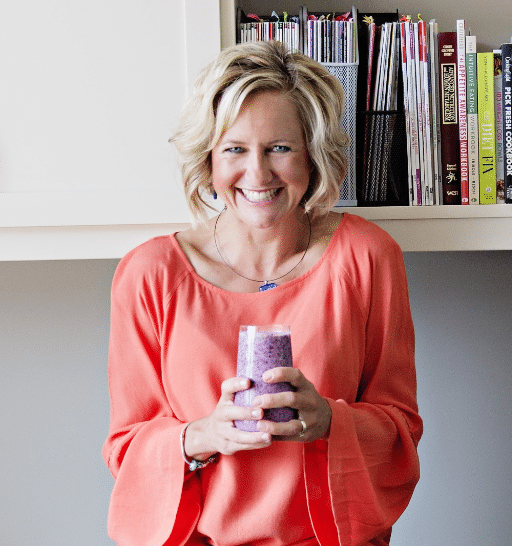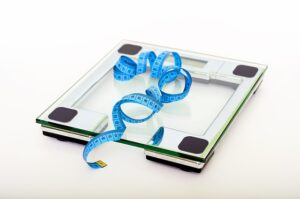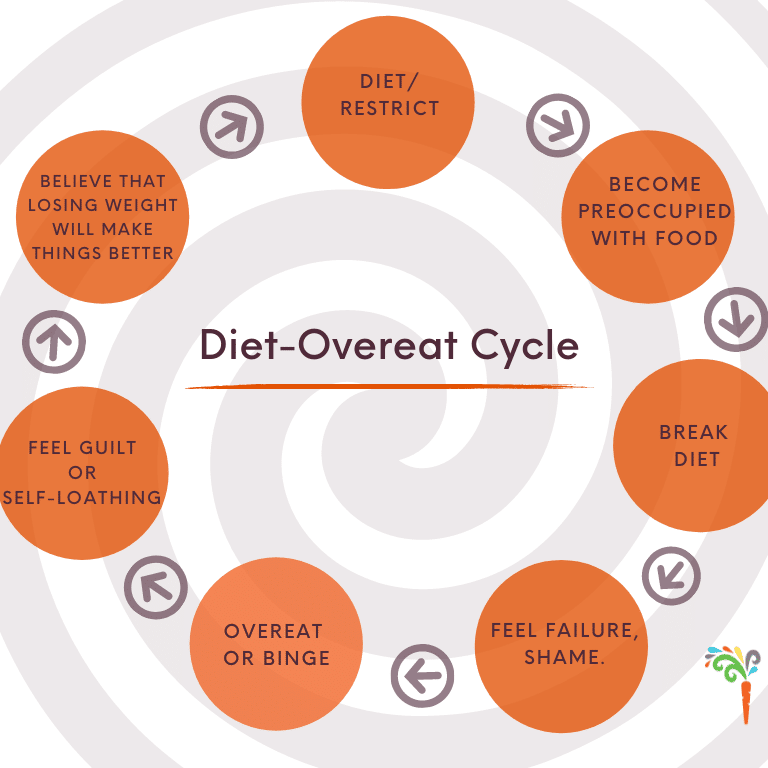Body image in midlife: How to improve yours
Trigger Warning – this blog post explores body image, body dissatisfaction and includes reflective questions to explore your own body image. If you or someone you know would benefit from additional support, contact NEDIC or a regulated health professional to access resources to support you.
Most women’s body image in midlife needs support. Body image is the picture we hold of our body in our mind. As we go through life, our body image can become imbalanced or disturbed from life experiences or years of marinating in a culture that promotes certain bodies, traits or images as being desirable. Body image disturbance can include body dissatisfaction, intense fear of weight gain, disturbance in the way one’s body weight or shape is experienced, and/or over-evaluation of body weight or shape on self-evaluation and self worth.
Our body image disturbance can come from different sources. Experiences in childhood, such as unsolicited comments intended to be “helpful” may be internalized with a sense of shame – that there is something wrong with us. Teasing about aspects of our bodies that make us different. Negative feedback about our body can also contribute. Socio-cultural ideals of bodies can also contribute to body image disturbance. Have a look at how the media showcases body diversity. Are some images glorified? (hint: yes!).
When I was a teenager, I was repeatedly teased for having big and round cheeks. It is a part of my body that made me different from others. I remember receiving a picture of a cartoon character with massive, round, fat cheeks, blowing a massive bubble, along with the nickname “Cheeks” (which I hated). While I know it wasn’t intended to be hurtful, it resulted in years of distortion of how I experienced that part of my body.
I think many of us can recall stories or experiences of parts of our body being objectified. Where it gets tricky is the ways we try to cope with the parts of us that are unique, but experienced as wrong or as a source of shame.
We have a toxic culture that places unrealistic expectations on how our bodies look (and a multi-billion dollar industry that will “help you” try to manipulate your body to look like some idealized image). I am not just talking about the dieting industry. Look at the anti-aging industry and how there are products that can supposedly keep you looking youthful. How much money are you spending each year on creams, botox and fillers?
Exploring where your body image comes from
All of us have a body image. As you think about your body image, I’d invite you to reflect on the following questions:
- What messages did you get earlier in life that influenced your feelings about your body? How did those messages impact your food choices, your movement choices and your relationship with food?
- What messages do you get now that influence how you feel about your body? What are the sources of these messages?
- How do friends or coworkers who diet, complain about and compare bodies, influence you?
- What is your history of dieting and how has it worked for you? How has it worked against you? Where has it left your relationship with food, activity and your body?
How does the culture in which you marinate contribute to your body image?
Have a look at the media and social media you consume, the people in your life, and the places you spend time. How does the culture in which you marinate contribute to your body image satisfaction (or dissatisfaction)? How is *your* body-type portrayed? How does this influence how you feel about your body?
Examine the behaviours you engage in that support body dissatisfaction.
Do you body check? Body checking can include weighing yourself, pinching, pressing body parts, measuring body parts, measuring body by trying on certain items of clothing, checking appearance in mirrors, comparing your weight or appearance to others, asking others if you look fat, taking pictures of yourself to check your appearance. It is the story that we attach to body checking, and the ways that we try to manipulate our bodies through diet and exercise that can become problematic.
How can you manage social and cultural pressures for your body image in midlife?
- Start to notice media messages and the images they show of people in midlife and the way they make you feel.
- Be skeptical of magazines and social media that show idealized and glorified body images.
- Limit magazines and social media designed to change or sculpt your body. Watch out for the magazines strategically placed at the grocery store check out.
- Resist the urge to participate in challenges where changing your body is the focus.Your body is a complex machine that can be influenced, but not controlled, by what you eat, how you move, how you manage stress and sleep.
- Refuse to participate in conversations that make you feel bad about your body.
How can you improve your body image in midlife?
Buy clothes that fit you now.
Our bodies change as we go through life. Holding yourself hostage to the pair of jeans or the expensive suit that no longer fit you can contribute to disturbed body image throughout the day. The process of accepting your midlife body can sting. Buying yourself clothes that fit the body you have right now can be life altering, and allows you to focus on caring for yourself as well as other important parts of your life.
Look at other people with appreciation, not criticism or envy.
What do you enjoy about the people in your life? What qualities about your friends do you most enjoy? What makes them important to you? Reflecting on this helps you realize that what you love about people is what is inside them.
Make a list of positive characteristics about yourself that are unrelated to your appearance.
Turning inward, what are the qualities about yourself that you appreciate? What unique skills and abilities do you have and share with others? What do others notice and appreciate about you? How do others count on you?
Connect with your body in positive ways.
Move your body because it feels good, not because it is punishment for something you ate. Moving our bodies is a privilege. Explore weight training to help you embody strength and power. Explore yoga to open up your hips and release tension in your neck. Explore Tai Chi as a form of mind-body connection. Do a couch-to-5 km walking program. Learn to run. Fuel your body with tasty food that satisfies you throughout the day. Notice how the food you eat satisfies you.
Do activities that you enjoy.
Add in sources of positivity and fun in your life. What in your life makes you feel good? What gives you enjoyment? How can you expand your focus to include these activities? Making your world bigger than changing your body.
Final thoughts about body image in midlife
Midlife is a time when many of us challenge our body image. Instead of comparing ourselves to who we were in our 20s and 30s, remember that our bodies change as we go through life. We are not the same people we were in our 20s and 30s. We are meant to change and evolve.
There are big demands on our time in midlife. Our health profiles may have changed. Our relationships may be changing. We have families and communities to care for. We have jobs and responsibilities. We are older and more experienced. How can we, as our wisest and caring selves, begin to embrace and care for the bodies we have right now?
How can we care for our body with balanced nutrition that we actually enjoy, with movement that feels good, addressing habits that aren’t serving us, adding in habits that are aligned with our values and priorities, and creating a diet and lifestyle that slides into our life, rather than being *the* focus in our life. How can we embrace these aspects of our lifestyle from a perspective of self-care and vitality, and not self-rejection?
Additional resources:
10 Steps to a positive body image
https://www.nationaleatingdisorders.org/learn/general-information/ten-steps
National Eating Disorders Information Center
More than a Body
Sources:
Herrin M, Larkin M. Nutrition counseling in the treatment of eating disorders. 2012. https://www.amazon.ca/Nutrition-Counseling-Treatment-Eating-Disorders/dp/0415642574
National Eating Disorders Association. 10 Steps to a Positive Body Image.
https://www.nationaleatingdisorders.org/learn/general-information/ten-steps
Hofmeier SM, Runfola CD, Sala M, Gagne DA, Brownley KA, Bulik CM. Body image, aging and identity in women over 50: the gender and body image (GABI) study. https://www.ncbi.nlm.nih.gov/pubmed/27399268
Medeiros de Morais MS1, Andrade do Nascimento R2, Vieira MCA2, Moreira MA3, Câmara SMAD4, Campos Cavalcanti Maciel Á2, Almeida MDG1. Does body image perception relate to quality of life in middle-aged women? PLoS One. 2017 Sep 19;12(9):e0184031. https://www.ncbi.nlm.nih.gov/pubmed/28926575
McLaren L1, Kuh D. Body dissatisfaction in midlife women. J Women Aging. 2004;16(1-2):35-54. https://www.ncbi.nlm.nih.gov/pubmed/15149923
Runfola CD1, Von Holle A, Peat CM, Gagne DA, Brownley KA, Hofmeier SM, Bulik CM. Characteristics of women with body size satisfaction at midlife: results of the Gender and Body Image (GABI) Study. J Women Aging. 2013;25(4):287-304 https://www.ncbi.nlm.nih.gov/pubmed/24116991
Tagged in: body image, body image dissatisfaction, Calgary Dietitian, Calgary Nutritionist, disordered eating, menopause, midlife body image, perimenopause, relationship with food


Welcome to the Energize Nutrition blog, where we share evidence-based nutrition content, designed to empower people’s midlife. Take a look around to find information on feeling your best.
If you need more individualized support, reach out to set up a free discovery call with Kristyn Hall.

Battling chronic hunger, poor energy, or inflammation? Discover what this powerful ingredient is and why it might be the solution!











